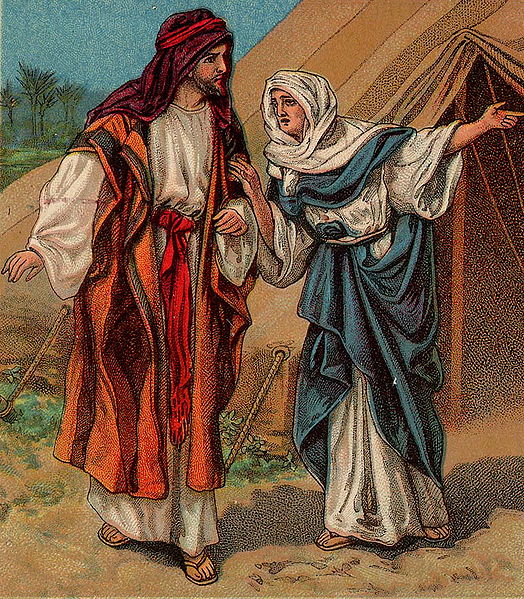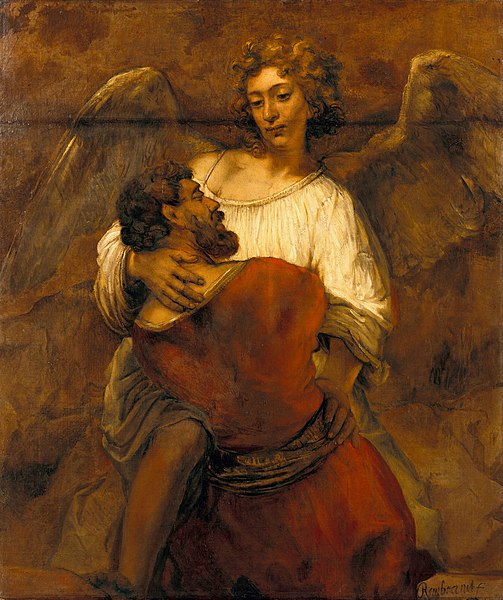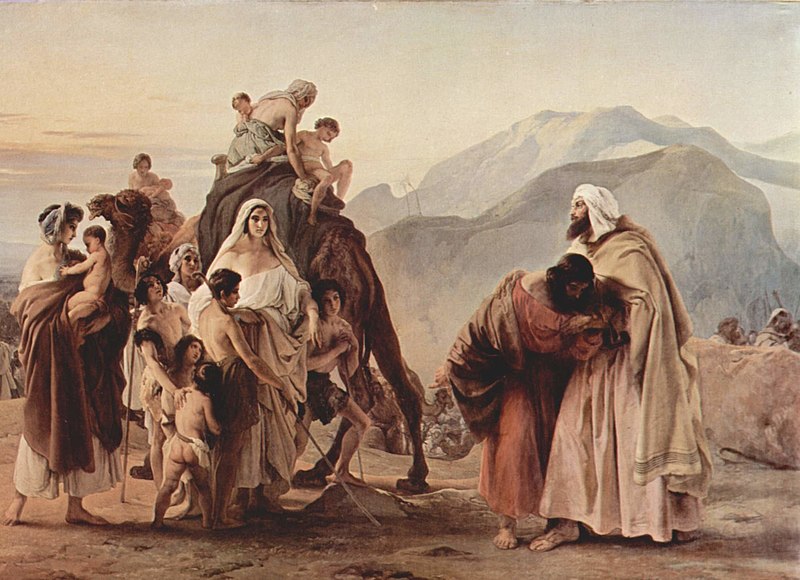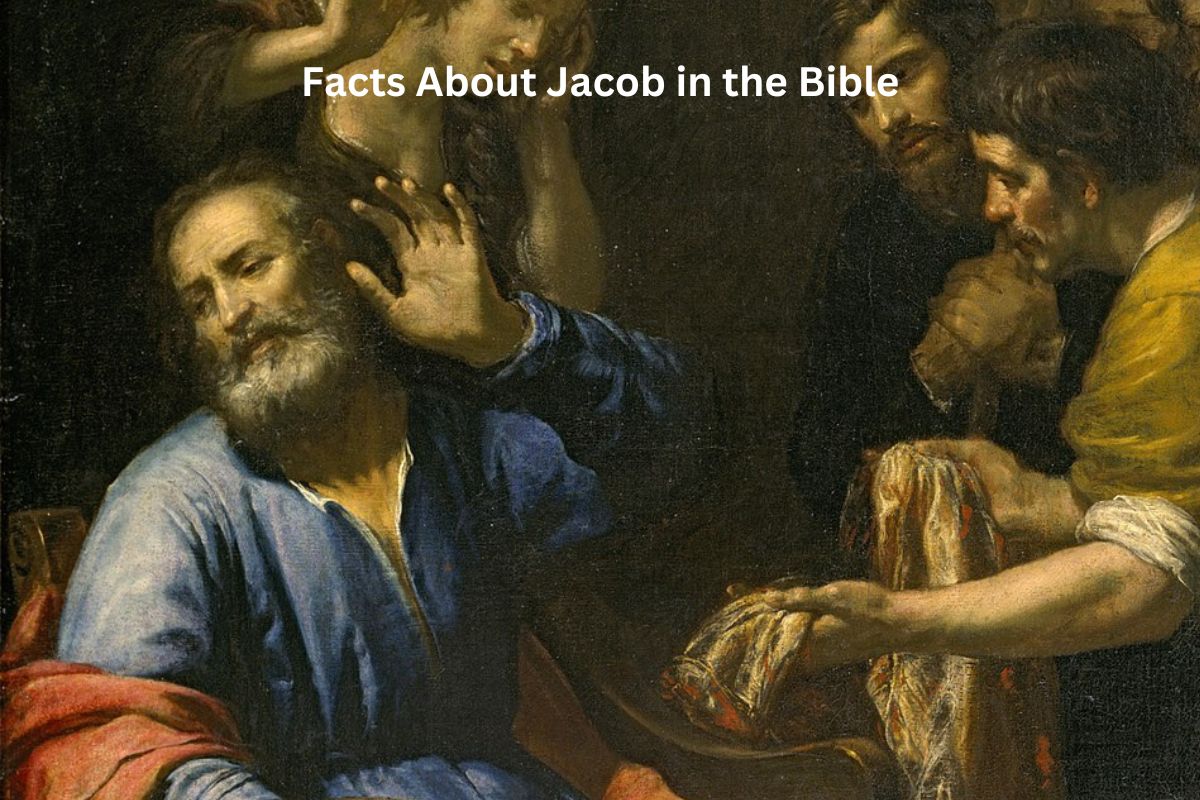Jacob, a central figure in the Bible, is known for his intricate life story and pivotal role in the formation of the nation of Israel.
He was the son of Isaac and Rebekah, the twin brother of Esau, and a man whose life was marked by deception, divine encounters, and profound family dynamics.
Jacob’s journey includes his acquisition of his father’s blessing, his flight to Haran, his marriages to Leah and Rachel, and his transformation through a mysterious wrestling match with God.
He became the father of the twelve tribes of Israel, reconciled with his brother Esau, and was buried in the sacred Cave of Machpelah. Jacob’s life is a rich tapestry of faith, struggle, and divine providence, making him a significant figure in biblical history.
Jacob in the Bible Facts
1. Son of Isaac and Rebekah
Jacob, whose name means “he deceives” or “he supplants,” was born to Isaac and Rebekah in the book of Genesis.
Also Read: Facts About Peter in the Bible
His birth is significant because he was the second-born of twins, with his elder brother Esau being born just before him. This birth order played a crucial role in their future interactions and the inheritance of blessings.

2. Twin brother of Esau
Jacob’s twin brother Esau was his opposite in many ways. Esau was described as a skilled hunter, physically strong, and favored by their father Isaac.
In contrast, Jacob was more inclined toward domestic life, cooking, and shepherding. Despite their differences, they were both central figures in the narrative of the patriarchs.
3. Stole Esau’s birthright
One of the most famous stories involving Jacob is the incident where he cunningly acquired Esau’s birthright. Esau returned from hunting one day famished and asked Jacob for some of the red lentil stew he had prepared.
Also Read: Ezra in the Bible Facts
Jacob agreed but only on the condition that Esau sell his birthright to him in exchange for the food. Esau, in his hunger, agreed, essentially giving up his right to inherit the family’s wealth and leadership position.
This event set the stage for future conflicts between Jacob and Esau and eventually led to Jacob’s deception of their father Isaac to receive the blessing that was intended for Esau. It also earned Jacob the reputation of being a cunning and opportunistic individual, which is reflected in the meaning of his name.
4. Received a blessing from Isaac
Jacob’s acquisition of his father Isaac’s blessing is one of the pivotal events in his life. This blessing, which was originally meant for Esau, was secured through deception orchestrated by Jacob’s mother, Rebekah.
Isaac, who was old and nearly blind, summoned Esau to hunt game and prepare a meal for him before giving him the blessing. Rebekah overheard this and convinced Jacob to pose as Esau by covering himself in animal skins to simulate Esau’s hairy appearance.
Jacob followed his mother’s plan, and Isaac, mistaking him for Esau, unknowingly bestowed the blessing upon Jacob instead. This blessing included a promise of prosperity, leadership, and a dominant position within the family.
When Esau discovered what had happened, he was furious and vowed to kill Jacob, prompting Jacob to flee to Haran to seek refuge with his uncle Laban.

5. Fled to Haran
Jacob’s flight to Haran was motivated by the threat of his brother Esau’s revenge. On his journey, he had a profound encounter with God where he dreamt of a ladder reaching from earth to heaven, with angels ascending and descending.
God reaffirmed the covenant He had made with Jacob’s ancestors, Abraham and Isaac, promising to be with Jacob and bless him.
In Haran, Jacob sought refuge with his uncle Laban. During his time there, he worked for Laban and eventually married Laban’s daughters, Leah and Rachel, as well as their maidservants, Bilhah and Zilpah. These marriages would lead to the formation of the twelve tribes of Israel.
6. Married Leah and Rachel
Jacob’s marriages to Leah and Rachel are significant aspects of his life story. Jacob initially fell in love with Rachel, Laban’s younger daughter, and agreed to work for Laban for seven years in exchange for her hand in marriage.
However, Laban tricked Jacob by giving him Leah as his wife instead of Rachel on their wedding night.
Jacob then agreed to work another seven years to marry Rachel as well. This resulted in Jacob having two wives, Leah and Rachel, and later, he married their maidservants, Bilhah and Zilpah, at the request of Leah and Rachel.
From these unions, Jacob had twelve sons, who would go on to become the heads of the twelve tribes of Israel, shaping the future of the nation.
7. Wrestled with God and received the name Israel
One of the most enigmatic episodes in Jacob’s life is his wrestling match with a mysterious figure, often interpreted as an angel or even God Himself.
This encounter occurred as Jacob was about to reunite with his brother Esau after years of separation. Jacob wrestled with this figure throughout the night near the Jabbok River.
During the struggle, Jacob refused to let go until he received a blessing. The mysterious figure acknowledged Jacob’s determination and gave him a new name, Israel, which means “he who struggles with God” or “God contends.” This name change symbolized Jacob’s transformation and his new status as the father of a nation.

8. Father of the Twelve Tribes of Israel
Jacob’s most significant legacy is his role as the father of the twelve sons who would become the heads of the twelve tribes of Israel. These sons were born to his two wives, Leah and Rachel, and their maidservants, Bilhah and Zilpah.
Each of these tribes played a crucial role in the formation of the nation of Israel and had unique characteristics and territories within the Promised Land.
9. Reconciled with Esau
After many years apart and the initial tension caused by Jacob’s deception, Jacob and Esau reconciled. Jacob sent messengers and gifts to Esau as a peace offering when he learned that his brother was approaching with a large company of men.
When they finally met, Esau showed forgiveness and embraced Jacob. This reconciliation marked a significant turning point in Jacob’s life, and the brothers parted ways on amicable terms.
10. Buried in the Cave of Machpelah in Hebron
Jacob lived to be 147 years old. Before his death, he gathered his twelve sons to bless them and predict their future. These blessings and prophecies played a crucial role in the establishment of the tribes’ destinies within Israel. Jacob then passed away in Egypt, where he and his family had settled during a time of famine.
Jacob’s remains were embalmed, and he requested to be buried in the Cave of Machpelah in Hebron, alongside his forefathers, Abraham and Isaac, as well as his wife Leah.
This burial site is significant in Jewish tradition and is considered one of the holiest sites in the world. Jacob’s legacy continued through his descendants, who grew into the nation of Israel, fulfilling God’s promises to the patriarchs.
